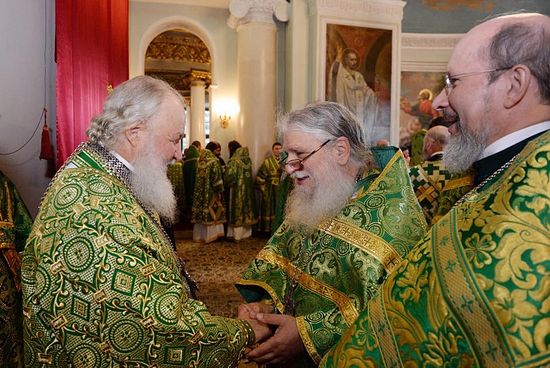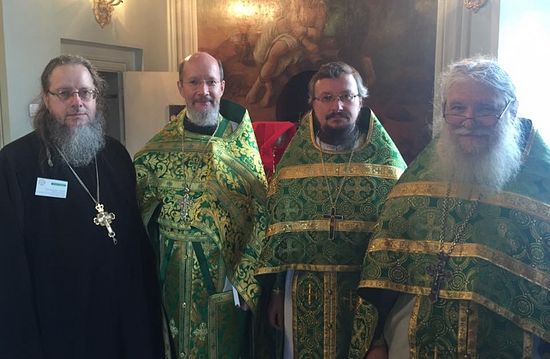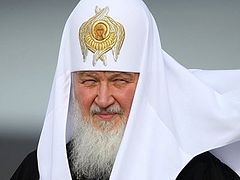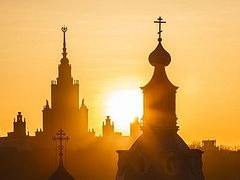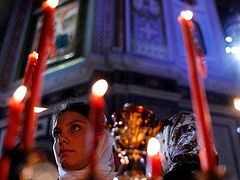Source: Holy Trinity Seminary
From September 21 to 25, 2016 the solemn celebrations took place in Moscow, dedicated to the 1000-year anniversary of Russian monastic presence on Mount Athos. Our Rector and Associate Professor of Patrology, the Very Rev. Archimandrite Luke (Murianka), was invited to take part in the celebrations, which included an academic conference, as well as a meeting of all abbots and abbesses of the Russian Church. On September 29, Deacon Andrei Psarev, a member of our faculty, interviewed Fr. Luke in the abbot’s office in Jordanville, asking him to share with our readers his impressions from this solemn event.
Fr. Luke, you have just come back from a very rapid visit to Russia; you spent less than a week there. Your commitment to Jordanville is very impressive. What was the occasion for your visit?
I was invited to the celebration of the 1000th anniversary of Russia's monastic presence on Mt. Athos. There was a gathering of more than 600 abbots and abbesses in Moscow in order to take part in church services, lectures, talks and the opening of an exhibit in the museum of Christ the Savior commemorating the event.
It was a five-day event. I understand there were many experts on the theme from the various corners of the world. What did you learn from this intensive time in Moscow?
There were talks given by His Holiness Patriarch Kirill, talks that were edifying and directed to us- the members of the monastic community, especially the abbots and abbesses- encouraging us, giving us some guidelines. They presented a picture of the far past (before the revolution), what happened during the revolution, and exactly what is going on in contemporary monastic life. What I found very moving and refreshing was that His Holiness very realistically described the situation in Russia and the strengths and the weakness that monastic life in Russia now faces.
The other talks were by bishops and priests from various areas, mostly from Russia. I would like to mention the talk on the history of the Athonite monastic traditions by Priestmonk Kyrion of St. Panteleimon's monastery, and also, the lecture of Dr. Jean-Claude Larchet who spoke concerning spiritual life and monasticism. Some of the more edifying for me were about the importance of confession, the revelation of thoughts and the significance of obedience. Other talks were of a more historical, academic nature.
For me, the ones that were more practical were the most important, and I came away with some ideas that I could bring home. That was the most important reason for going: so I could help to improve, to form, the monastic community here in Jordanville.
Did you go to Holy Trinity St Sergius Lavra?
No. We had a choice on that day; the entire group was split. One remained in Moscow with the Patriarch to hear his address towards us abbots and abbesses, and the other group of a more academic inclination went [to Holy Trinity Lavra]. Although I would have liked to have gone and visited the Lavra, the reason I traveled to Moscow was my being the abbot of a monastery, and so, I needed to be present when the Patriarch expressed his ideas and gave us his advice.
Did you have a chance to meet your peers, abbots from Russia or other places, to exchange opinions?
Yes, I did have time in between the lectures. There were so many talks, and it was so saturated that we even missed some of the breaks that were actually scheduled because we just kept going.
But in between talks and at other times, I did have the opportunity to have longer discussions with the abbots in Russia, three in particular, and I addressed some of my thoughts to Abbess Sophia from St. Petersburg. I was very impressed with what she had to say about the difficulties that abbots and abbesses have now in Russia because of the cultural and psychological environment among the young people. Monastic formation necessitates an extremely individual approach to each person.
She made an interesting comment about what she has to deal with today: worse than any kind of drug addiction is the Internet. Of course, that fact came out many times during the conference. The Patriarch and others brought up the problem that some monastics are obsessed with cell phones and the Internet. This is part of the real world; this is part of being open to the world. We have to expect the monastics to come with their difficulties, their weaknesses, and we have to look at these things and deal with them with open eyes. We can't idealize. We just need to accept them, and again as she stated, monastic formation requires a very individual approach. Not only one rule for everybody. That is impossible.
May I conclude, generally, that your impressions are quite positive?
I was very edified. I think that the Patriarch and others were able to very clearly define that two of the major problems in Russia are that there has not been a continuity with the past and that many of the heads of the monasteries, the abbots and abbesses, are young. As he said, "you have to teach others, but you yourself are learning."
Because of communism, spiritual leaders and monasteries were destroyed. The people from whom some kind of continuity could have been passed on were lost in many cases, and probably, in the majority of cases.
So, many monastic communities are being established with people who have very little experience and training from an older generation. They are starting completely fresh. It's like starting from zero, and as Vladyka [Metropolitan] Laurus told me once, but I did not understand at the time, Russia has to start again from the days of St. Vladimir. Now more and more, I see that this is actually the situation.
I am very grateful for having heard about continuity because it gives me a better perspective on our monastery. We do have a continuous tradition. I think of the generation that's gone now. I was able to learn from them, to have fellowship with them, and to be under obedience to them. I know that where they gained their monastic experiences is genuine and connected to the past.
From the physical connection, from reading what many of the older fathers have left behind, and mostly, from being advised by them about many things, I recall exactly what they said. They, indeed, did form me. Since I saw how they were formed, I know that there is a continuous tradition here in Jordanville.
And perhaps that's what we can bring to the table?
Well, we could if we are humble enough not to think we have all the answers. If I thought that I could go teach 600 abbots and abbesses in Russia, that would be absurd, and I wouldn't even think of it for a moment.
I did share some of my thoughts. I repeated some of the words of Archimandrite Kyprian (Pyzhov), of Vladyka Laurus and other Jordanville Fathers and shared the experience I gained through the four decades that I have been in the monastery.
They were all younger than I am; in fact, everyone seemed to be more or less younger than I am, except probably his Holiness.
And you were probably one of the senior clergymen by your ordination?
Well, to some degree probably. I didn't ask. We know we are not supposed to take the first place, so I hid until they actually, literally, dragged me out to the front. They kept pushing me forward and forward, until finally I was nearly next to the last bishop. Somebody actually did push me and said, "Go! Go up there!"
So, basically, what I hear from your response is that, with some humility, we could contribute something?
Yes, I think we probably could but on an individual basis if people ask us questions. Through my personal contact, I was very freely expressing my thoughts, what I had lived through, and the lessons that I learned from the older fathers.
In every case, I saw that these were received with surprise, with some amazement. People were very edified, as if this was the first time they'd heard these things. They actually mentioned, "Well, we don't know how to deal with these things. This is amazing! We have never heard this before, and we could use this experience."
I think that, unfortunately, of course, many times the young abbots and abbesses just pick up books, rules, monastic guides, and they just start with these texts. They don't have too much of a living tradition to interpret them, to know how to use them. I just spoke from the heart, and it seemed to make an impression. I didn't expect that. I wasn't there to make impressions.
Fr. Luke, why is Russia important to the monastic and academic community of Jordanville? Why is it important to stay in tune with Russia?
Well, because we are part of the Russian Church. It's where our roots are- in the Russia Church.
There's a lot of true renewal of spiritual life, of monastic life. Very sincere people are living an Orthodox lifestyle, living a monastic lifestyle, trying to. I think it's good to have, as much as we can, contact with these people, and we can learn from them. We can be edified, inspired, by them, by what they are doing. By talking to them and listening, I came away with very useful information, inspiring services, pious practices, and attitudes. I think people should go and experience this also.
The scholarship in Russia, the academic world, is vast. It's growing all the time. Although I don't know the entire limit or scope of what is going on, I sometimes get a feeling that theological, academic life has remained in the 19th century or close to the 20th century. That's why sometimes some of their theological attitudes, etc., come to us as a surprise. It's almost as if you're speaking to people from 1840 or 1880 and not from the experience that we had, which came from those spiritual leaders who nurtured the beginning and continual life of the Russian Church Abroad. That's another very important subject.
Also, I deduce from what you said that the level of discussion, the degree of discussion, was quite honest, quite open?
That was very refreshing. I remember 5 years ago, 10 years ago, when I was in Russia for the talks in the commission between the two churches for reconciliation, there was less of a desire to be open about what happened in the past 70-80 years. Even when we mentioned things, there seemed to be some reticence in discussing these things.
But this time, I heard both from His Holiness Patriarch Kirill and from others, many times, about the destruction by the Bolsheviks, the cruelty, the massive loss of life, etc. The conversation was very open and a very frequent, whereas in the past they were somehow not always anxious to bring these things up. This time, more and more, there was absolutely no hesitation, and even the last thing the Patriarch said was, "Well, soon it will be 2017, and this will be a good time for us to recall and reexamine, revisit, exactly what's happened to us and why it all happened."
Of course, it is very important for Russia that there is a true Orthodox spiritual understanding about the Revolution- not a political but a spiritual understanding of what all of that means and how it happened. As the people say, "It's almost as if God said, 'you want to create paradise on earth? Then, you try to do that and see what happens. See how you can live without Me and without the God-preserved Russian czar.'" St. John of Kronstadt mentioned that you must not touch the anointed one or there will be a blood bath. Of course, this all took place exactly how the prophets of Russia said it would take place. So, I think all this is being revisited. From what I see, it is from a very good perspective.
The Patriarch mentioned many weaknesses in monasticism; he said some of these were present in pre-Revolutionary Russia. He said the monastery should be a place of prayer and not a collective farm where people just work. He said we have to be very careful that we don't think that there is a good monastic life if everybody is just working day and night. He said that's not what we are here for. You might say he reprimanded us, chided us, directed us, revealed some weaknesses from the past and the present with hopes that these would not continue into the future but that there would be improvement.
In the end, he said that things have to be done very carefully and with love. We must not come out with a hammer or a hatchet and try to use military discipline on people. It's totally not the way to go about correcting things, and we have to remember the individual when we begin to apply the rules. I believe that is absolutely correct, and I have always believed this.
Now, if you allow for a nice conclusion to this interview, so we remember the individual and show love.
When you begin to apply rules etc., you have to do it with love and remember the individual, not hammer people and insist that there is one rule for everyone. Keep this in mind. There are general things that are good and should be striven for. We all have to consider the times we live in and the people we are dealing with when we begin to correct and direct.
Thank you very much for this informative interview, Fr. Luke. I am very happy to hear about your trip and your positive impressions.
I would like to thank the organizers of the conference for inviting me. I was very impressed by their work. Many young people were involved. What impressed me most of all was that all of them were very respectful, attentive, and spiritually cultured, from start to finish- to the last person that opened the trunk in the taxi to send me to the airport. He bowed to me, took my blessing, and said, "God bless your trip. May an angel go with you."

